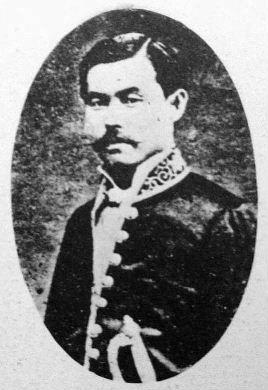Rikken Teiseitō on:
[Wikipedia]
[Google]
[Amazon]
 The was a short-lived
The was a short-lived
 The was a short-lived
The was a short-lived conservative
Conservatism is a cultural, social, and political philosophy and ideology that seeks to promote and preserve traditional institutions, customs, and values. The central tenets of conservatism may vary in relation to the culture and civiliza ...
political party
A political party is an organization that coordinates candidates to compete in a particular area's elections. It is common for the members of a party to hold similar ideas about politics, and parties may promote specific political ideology, ...
in the Meiji period
The was an era of Japanese history that extended from October 23, 1868, to July 30, 1912. The Meiji era was the first half of the Empire of Japan, when the Japanese people moved from being an isolated feudal society at risk of colonizatio ...
Empire of Japan
The Empire of Japan, also known as the Japanese Empire or Imperial Japan, was the Japanese nation state that existed from the Meiji Restoration on January 3, 1868, until the Constitution of Japan took effect on May 3, 1947. From Japan–Kor ...
. It was also known as simply the Teiseitō.
History
The Teiseitō was founded in March 1882 by the editor of the ''Tokyo Nichi Nichi Shimbun
The (lit. ''Tokyo Daily News'') was a newspaper printed in Tokyo, Japan
Japan is an island country in East Asia. Located in the Pacific Ocean off the northeast coast of the Asia, Asian mainland, it is bordered on the west by the Sea of ...
,'' Fukuchi Gen'ichirō, and a number of bureaucrats and conservative journalists as a political support group for the conservative Meiji oligarchy
The Meiji oligarchy was the new ruling class of Meiji period Japan. In Japanese, the Meiji oligarchy is called the .
The members of this class were adherents of '' kokugaku'' and believed they were the creators of a new order as grand as that e ...
. The new party was supported by Itō Hirobumi
Kazoku, Prince , born , was a Japanese statesman who served as the first prime minister of Japan from 1885 to 1888, and later from 1892 to 1896, in 1898, and from 1900 to 1901. He was a leading member of the ''genrō'', a group of senior state ...
and Inoue Kaoru. It advocated a constitutional monarchy
Constitutional monarchy, also known as limited monarchy, parliamentary monarchy or democratic monarchy, is a form of monarchy in which the monarch exercises their authority in accordance with a constitution and is not alone in making decisions. ...
with a constitution
A constitution is the aggregate of fundamental principles or established precedents that constitute the legal basis of a polity, organization or other type of entity, and commonly determines how that entity is to be governed.
When these pri ...
, to be eventually granted by Emperor Meiji
, posthumously honored as , was the 122nd emperor of Japan according to the List of emperors of Japan, traditional order of succession, reigning from 1867 until his death in 1912. His reign is associated with the Meiji Restoration of 1868, which ...
, an electoral franchise based on adult male property holders, and restrictions on freedom of speech and assembly. It viewed the populist political parties, especially the ''Rikken Kaishintō
The was a political party in the Empire of Japan. It was also known as simply the Kaishintō.
The Kaishintō was founded by Ōkuma Shigenobu on 16 April 1882, with the assistance of Yano Ryūsuke, Inukai Tsuyoshi and Ozaki Yukio. It receive ...
'' and the '' Jiyūtō'', as its main rivals. It was disbanded in September 1883.
References
Defunct political parties in Japan Political parties established in 1882 Political parties disestablished in 1883 1882 establishments in Japan Political parties in the Empire of Japan 1883 disestablishments in Japan {{Japan-gov-stub